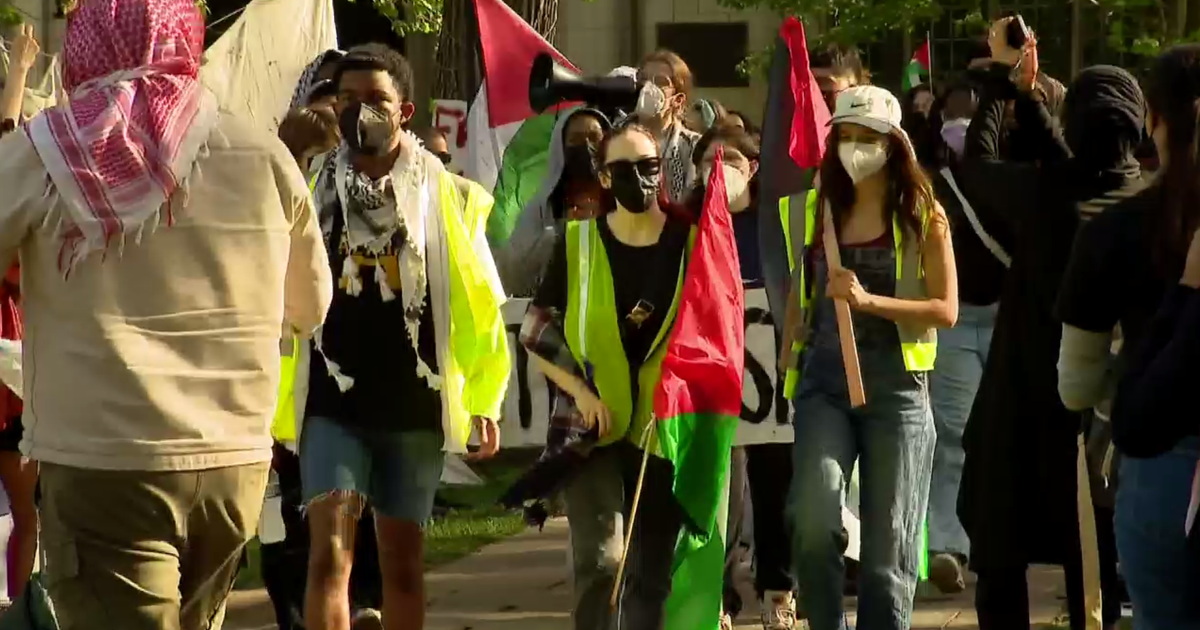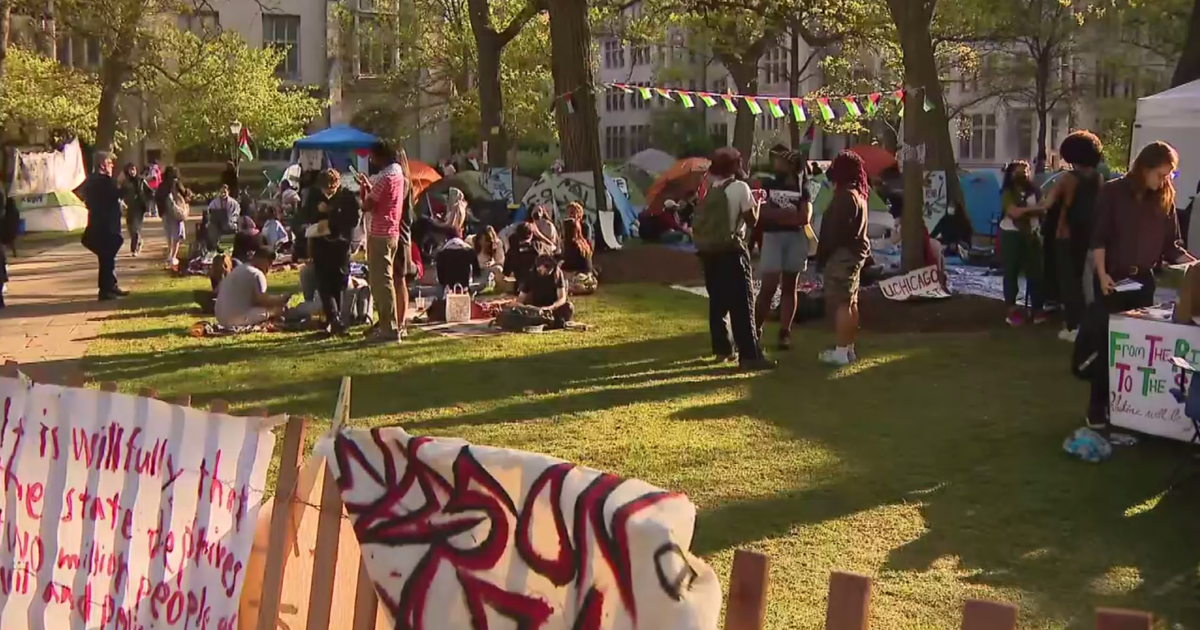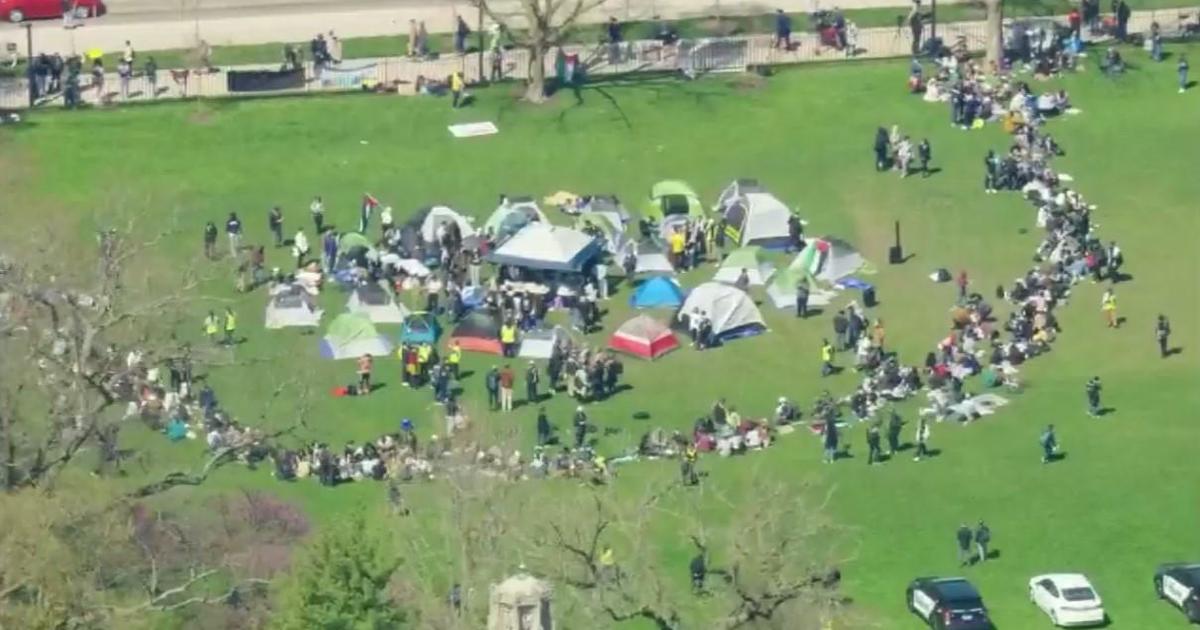University of Chicago announces plans to expand access to books that have been banned
CHICAGO (CBS) -- Illinois Gov. JB Pritzker was on hand Tuesday as the University of Chicago Library announced its effort to build a collection of more than 1,500 books that are banned across the U.S.
This week marks Banned Books Week – which was launched in 1982 after a surge of challenges to books in schools, libraries, and bookstores at that time. Organizers note that the event highlights the value of free access to information.
To commemorate Banned Books Week, Pritzker was joined by UChicago President Paul Alivisatos and University Librarian and Dean of the University Torsten Reimer for the announcement of the banned books collection. The university is seeking to expand access to banned books for researchers and the general public in Chicago and beyond.
The U of C noted that the American Library Association reports attempts to ban literature are on pace to set a record for the third year in a row. In the first eight months of this year, UChicago reports, the ALA recorded challenges to 1,915 unique book titles – a 20 percent jump over the same period in 2022.
Books written by people of color or members of the LGBTQIA+ community were most frequently targeted.
"The University's distinctive culture is built upon its commitment to advancing free expression and free inquiry," Alivisatos said in a news release. "By providing more opportunities for people nationwide to access a wide range of books, we are putting that fundamental principle into action."
"The freedom to read is one of the core tenets of a democratic society, which is why I signed legislation restricting book bans in Illinois libraries," Pritzker added in the release. "The University of Chicago has taken another admirable step for freedom of education with this resource, which I know will serve patrons and remind those that seek to suppress creativity that we will not be silenced."
The U of C's comprehensive banned books collection will be housed in collections at the Regenstein, Mansueto, and Crerar libraries on campus. They will be available to look at by the public free of charge – in person with a visitor's pass.
Members of the UChicago community will be able to check out most of the books, and they can be borrowed by readers at other libraries through interlibrary loans, the U of C said.
"We believe that knowledge enriches life, and book bans stand against freedom of inquiry and expression and therefore against the core principles of the University of Chicago," Reimer said in the release. "I am pleased that we are announcing our efforts to extend access to banned books in the same week that the University of Chicago Forum for Free Inquiry and Expression is celebrating its opening, as our efforts go hand in hand."
The U of C is also working with the Digital Public Library of America to expand access to banned books for those who cannot get to Hyde Park easily.
The university plans to fund access to banned e-books for all Illinoi s resident for at least year through the Digital Public Library's Banned Book Club on the Palace e-reader app. The university also plans to work with the DPLA to increase online access to books in communities where they are banned – through expanded agreements with publishers.
UChicago noted that its library already owns about 25 percent of a list of more than 1,500 books that have been banned from libraries across the U.S.
"We are excited to collaborate with the UChicago Library to increase the number of titles we can make available and bring this collection to readers throughout Illinois," John S. Bracken, Executive Director of the DPLA, said in the release.
Meanwhile, the American Library Association's Office for Intellectual Freedom provides a list each year of the most challenged books – as reported in the news and submitted by libraries and teachers. This is the last for last year:
1. Gender Queer by Maia Kobabe, a graphic memoir recounting the author's adolescence, coming of age, and journey to self-identity as being outside the gender binary. Reasons: LGBTQIA+ content and claims of being sexually explicit.
2. All Boys Aren't Blue by George M. Johnson, a "memoir-manifesto" documenting the author's experiences growing up as a queer Black man in New Jersey and Virginia. Reasons: LGBTQIA+ content and claims of being sexually explicit.
3. The Bluest Eye by Toni Morrison, the story of Black 11-year-old girl named Pecola Breedlove who grows up in a violent household after the Great Depression. Reasons: depiction of sexual abuse, claims of being sexually explicit, and equity, diversity, and inclusion content.
4. Flamer by Mike Curato, a graphic novel telling the story of a young teenage boy away at summer camp named Aiden Navarro – as he deals with bullying, friendships, and a boy he can't get out of his mind as he finds his way toward self-acceptance. Reasons: LGBTQIA+ content and claims of being sexually explicit.
5. (TIE) Looking for Alaska by John Green, the story of a teenage boy named Miles "Pudge" Hatter attending an Alabama prep school – where he acquires a group of close friends, becomes infatuated with a young and emotionally struggling woman, and experiences the highs and lows of adolescence and a tragedy. Reasons: claims of being sexually explicit and LGBTQIA+ content.
5. (TIE) The Perks of Being a Wallflower by Stephen Chbosky, the story of a "wallflower" named Charlie navigating his way through high school and experiences with sex, drugs, family issues, and loss. Reasons. claims of being sexually explicit, LGBTQIA+ content, depiction of sexual abuse, drugs, and profanity.
7. Lawn Boy by Jonathan Evison, the story of a young Mexican American Man named living in Washington state named Mike Muñoz who is looking to fight for his piece of the American dream. Reasons: LGBTQIA+ content and claims of being sexually explicit
8. The Absolutely True Diary of a Part-Time Indian by Sherman Alexie, the story of Arnold Spirit Jr., or "Junior," a Native American teen and his experiences attending an all-white public high school away from the Spokane Reservation where he lives. Reasons: claims of being sexually explicit, profanity.
9. Out of Darkness by Ashley Hope Perez, the story of a Mexican American teenage girl named Naomi Vargas and a Black teenage boy named Wash Fuller, and their romance in the oil town of New London, Texas in the 1930s. Reason: claims of being sexually explicit.
10. (TIE) A Court of Mist and Fury by Sarah J. Maas, the second in the five-book young adult fantasy novel series, "A Court of Thorns and Roses," telling the story of a huntress named Feyre Archeron who is kidnapped and brought to the otherworldly faerie lands. Reason: claims of being sexually explicit.
10. (TIE) Crank by Ellen Hopkins, the story of a high school student names Kristina who becomes addicted to crystal meth and sees her life spin out of control. Reasons: Claims of being sexually explicit, drugs.
10. (TIE) Me and Earl and the Dying Girl by Jesse Andrews, the story of high school student and loner Greg Gaines, his one friend in school, and a childhood friend who is dying of leukemia. Reasons: Claims of being sexually explicit, profanity.
10. (TIE) This Book is Gay by Juno Dawson, a young adult nonfiction guide on sexuality and gender. Reasons: LGBTQIA+ content, sex education, claims of being sexually explicit.



